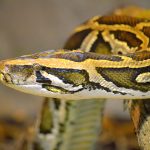The term “poison” refers to “a substance that, when introduced to or absorbed by a living organism, is capable of causing the illness or death of that organism.” The term “venom” refers to “a poisonous substance that is secreted by animals such as snakes, spiders, and scorpions and is typically injected into prey or aggressors by biting or stinging.” Venom can be found in animals such as snakes, spiders, and scorpions.
The Australian bearded dragon does not snort smoke or breathe fire, despite the fact that its name sounds like something out of a scary fairytale. However, according to research that was published in the scientific journal “Nature,” he is able to kill small prey with a moderate amount of venom. Bearded dragons are one of the most common reptiles that children keep as pets because they are calm and their venom doesn’t hurt people.
The venom that is produced by bearded dragons is extremely similar to the venom that is produced by rattlesnakes. Also, venom from the same family has been found in many different kinds of lizards, like the bearded dragon, the Komodo dragon, the Gila monster, the Mexican beaded lizard, and some monitor lizards.
When do bearded dragons bite?
Bearded dragons are typically very tame and have a placid demeanor due to their calm nature. Their personalities lean more toward being submissive and slow-moving, and they almost never display any signs of aggressive behavior. They become accustomed to being handled and petted very quickly as well.
Bearded dragons, when they perceive that they are in danger from humans, will frequently try to flee from their pursuers or will stand perfectly still in one place rather than actually attempting to attack. Because of this, it is not very common for captive-bred bearded dragons to display aggressive behavior toward humans.
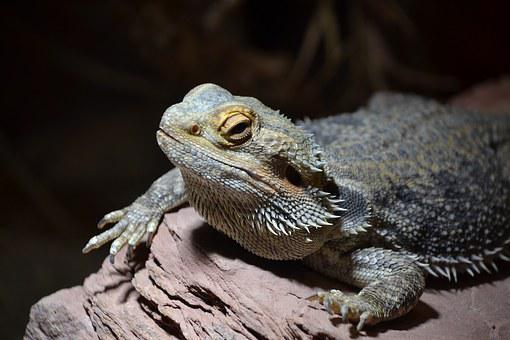
Are all lizards poisonous?
It was only known that two species of lizards across the world were poisonous up to 2005. The Gila Monster and the Mexican Beaded Lizard are the names of these two reptiles.
According to ABC Science, in general, snakes have always been thought of as being traditionally associated with venom. According to the findings of the study, approximately 2500 of the 3000 different species of snakes found around the world are poisonous.
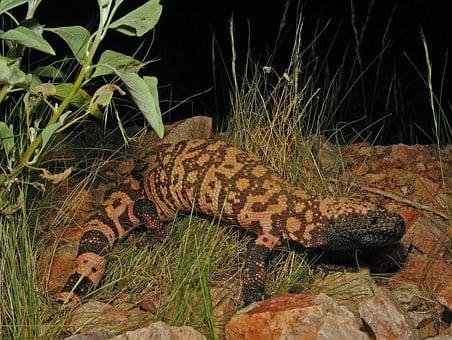
Do bearded dragons bite?
Yes, bearded dragons do bite, but they will not do this often or on purpose, as they are actually quite gentle and docile creatures that tolerate handling pretty well. If a bearded dragon bites you, start by staying calm and not pulling your hand back abruptly, which may cause more damage. Instead, hold the reptile’s body firmly and gently pull its jaws apart until you can take your hand away.
What happens if a bearded dragon bites you?
A bearded dragon bite feels like a strong pinch that may or may not break your skin or cause bruising. They do have teeth, and bites will usually hurt more from the shock of being bitten than the actual bite itself.
Five steps to follow if a bearded dragon bites you
- Stay Calm
Always remember to keep your cool when faced with a challenging situation.
- If you lose your cool, you and your pet may suffer severe damage.
- Most of the time, bearded dragon bites are not dangerous and only cause minor injuries like a sore finger or a small cut.
- Don’t pull back
- By maintaining your composure, you will be able to keep from jerking, shaking, or pulling out the hand or finger that has been bitten.
- Because of this, the bearded dragon may bite down even more forcefully, causing you to lose a portion of your finger.
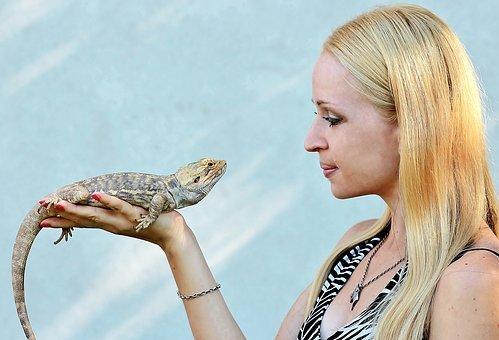
- Support The Body
- You should use the hand that is not holding the bearded dragon to support its entire body, or you should carefully place it on a table where it can rest.
- In situations in which the bearded dragon does not feel supported, such as when it is held in the air, it will clamp down more tightly in order to feel safe.
- It is possible that providing support will make the body feel comfortable enough to let go or start to loosen its grip on the object.
- Pull the jaws apart
- To separate the jaws of the bearded dragon, use the hand (or hands) that you don’t need to do anything else with.
- You might be surprised by how powerfully it can clamp down on something.
- Treat any bleeding or other injury
- After you get your hand or finger out, you will need to look at the spot where the animal bit you and give any medical care that is needed.
- It’s possible that you didn’t get any cuts or scrapes on your skin, and if that’s the case, congratulations! There is nothing else that must be done.
Are bearded dragon venomous to dogs?
There is no clear answer to the question of whether or not your dog will eat your bearded dragon or cause it any harm. Character and disposition are two aspects that differentiate one animal from another. Because there is no assurance that your pets won’t hurt one another, it is in your best interest to evaluate their actions and keep an eye on their interactions.
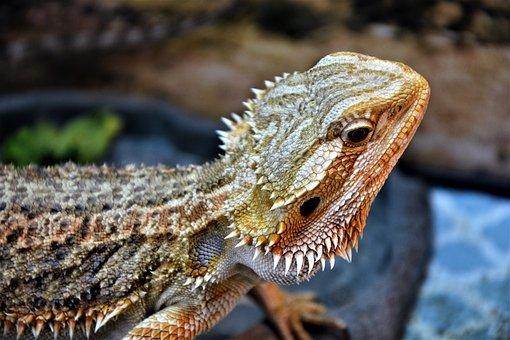
Are bearded dragons poisonous to cats?
The fact that bearded dragons are poisonous often comes as a shock to their owners. The toxicity of this venom is not sufficient to cause harm to humans, but it is sufficient to kill small pets. Bearded dragons cannot kill adult cats, and some of them might even shrug off the bite and carry on as normal without you even noticing it.
Do bearded dragon spikes hurt?
Bearded dragons do not pose a health risk to human beings. They do produce venom, which is used to temporarily immobilize their prey, but the amount of venom they produce is so minute that it cannot cause serious harm to humans. Biting is an unusual behavior for this creature, which, in general, is very docile. However, a bite might cause some temporary swelling.
Are Bearded Dragons Found in Africa and Are They Venomous?
Bearded dragons, although they sound like creatures from Africa, are not found there. They are native to the arid regions of Australia. Unlike the most venomous snakes in africa, bearded dragons possess no venom. They rely on their strong jaws and sharp teeth instead to catch and consume insects, providing a harmless and unique addition to the reptile world.
Why do bearded dragons have spikes on their bodies?
The numerous angular spikes and scales that are characteristic of bearded dragons serve a functional purpose. They assist in defending the lizards from the threats posed by their adversaries. Bearded dragons have a variety of large lizards and dingoes (Canis lupus dingo) as natural enemies in the wild. Dingoes are also a threat to bearded dragons.

